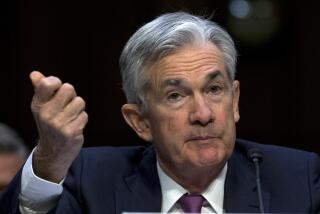International Business: SPOTLIGHT ON NEW ZEALAND : Keeping a Tight Lid on Inflation Is the Guiding Monetary Credo : Central bank: Adherence to policy has boosted economic growth to about 6% annually.
- Share via
In the complex world of monetary policy, the head of New Zealand’s central bank, Donald T. Brash, works under a relatively simple rule: Keep inflation under 2% or get fired.
The Reserve Bank of New Zealand abides by a unique and controversial law that makes controlling inflation the central bank’s No. 1 priority. Unlike central bankers in other nations, Brash doesn’t have to worry about reducing the unemployment rate or meeting other often contradictory economic targets. Stable prices are his only goal.
“Monetary policy should be targeted at a single objective: Reduce the inflation rate,” Brash said of his marching orders.
His tough stance on inflation reflects the hard economic times the country endured during the 1980s. Spiraling prices and growing government deficits were choking off economic development. In the mid-1980s, the government began a painful process to turn the economy around by privatizing state-owned companies and controlling inflation.
Under a 1989 law, the governor of the reserve bank is required to keep inflation within a range negotiated between the government and the central banker. Under the current contract, the annual inflation rate must remain between 0% and 2% annually through 1998, when Brash’s current term as governor ends. The government can fire Brash if he fails to meet the inflation goals.
“I’ve got to have a pretty good damn reason (to let prices rise) or I risk losing my job,” Brash said. Inflation was running at an annualized rate of 1.1% during the first half of this year.
But New Zealand’s tough inflation law is being challenged by the Alliance coalition, a group of five minor parties that is gaining political strength. The coalition wants to abolish the law as part of a plan to rebuild New Zealand’s former socialist government policies. Relaxing the bank’s tough policy on inflation would fuel economic growth and create more jobs, the Alliance argues.
But Brash said unleashing inflation would undermine policy that has boosted economic growth (to about 6% annually in the local currency), stabilized currency exchange rates and reduced the cost of long-term borrowing.
“There are more important social and economic objectives than (low) inflation,” said Brash, who has served as the bank’s governor since 1988. “But what can pushing up the inflation rate do to reduce the unemployment rate? It cannot reduce unemployment in any sustainable way.”
More to Read
Inside the business of entertainment
The Wide Shot brings you news, analysis and insights on everything from streaming wars to production — and what it all means for the future.
You may occasionally receive promotional content from the Los Angeles Times.










